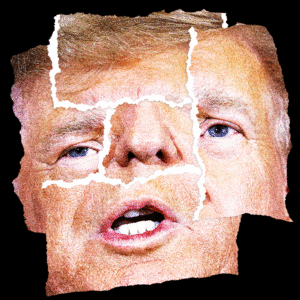What was surreal about Donald Trump’s inauguration as this country’s 47th president was how normal it was.
Yes, Trump promised a new era of territorial expansion for America—and to take back the Panama Canal. Yes, Melania was channeling Jim Carrey in “The Mask.” And yes in his less formal remarks following the Bidens’ departure, a relaxed Trump reverted more to campaign form and to more extreme characterizations of his political enemies.
But it was largely an orderly affair, replicating faithfully the pomp and the formality of past inaugurals. The proceedings were elevated by the presence of multiple former presidents. The Bidens and the Trumps were polite to each other; Kamala Harris, who narrowly lost the election, conducted herself with great dignity.
It was a bit like attending a wedding in which every guest present knows the marriage is a big mistake but no one dares say it.
Or was it?
What if there is another reason it was a little more civil than 2017 or 2021? What if Democrats, for all their major concerns about Trump, were beginning to find some common ground with the incoming president—or could, at least, find some silver lining within the storm clouds they associate with his presidency.
In conversations around Washington over the past few weeks, I’ve found numerous Democrats of this frame of mind; who, while fearful of Trump’s assaults on our system of government, on the environment, on the economy or on the international order, could point to some areas in which they were hopeful about for the next four years.
One senior Democratic member of Congress, a national security opinion-leader, offered me two: He noted, somewhat reluctantly, that during his last term, Trump’s toughness with our NATO partners did result in them committing a higher percentage of their budgets to defense of the alliance. He said he expected more of the same this time around.
Separately, he also speculated that Trump could probably do better in stabilizing the Middle East than had Biden, thanks to his close relationship with regional leaders. He expected that an Israeli-Saudi normalization was in the offing and that the setbacks suffered by Iran and its proxies in Gaza, Lebanon, Syria and Yemen would ultimately result in some kind of new agreement or understanding that could limit the threat of new wars in the region in the immediate future.
An Asia specialist who has served in a senior government role in recent Democratic administrations, meanwhile, said it was his expectation that Trump would actually end up with more nuanced policies on China than had the Biden Administration. While there are strong hawkish views toward Beijing on both the left and the right, within the Trump administration there are those (Elon Musk, for example) who have deep business ties to China, and will likely push for a more transactional kind of relationship. This individual and others I’ve spoken with indicated that, while Trump may start with tough talk and tariffs threats, they believe he could be more flexible if a deal could be struck for which he could later claim credit—like the Tik Tok turnaround.
Another member of Congress, from the West Coast, practically whispered to me the view that Democrats were essentially happy to hand off immigration reform to Trump. They fear his excesses, but are happy that his maximalist policies would mean he owned the issue moving forward—and that it could not again be used against Democrats. (For example, Trump will seek to undo the birthright citizenship provisions of the 14th Amendment by executive order. He can’t do that—and his attempt should put the issue to rest, as amending the Constitution is next to impossible). It’s twisted reasoning, but to be honest, it is one I heard expressed multiple times.
Many of the other areas in which Democrats were optimistic fall into a similar vein of what might also be called Trumpenfreude—joy that can be derived not by Trump’s successes but by his inevitable failures. There is an expectation that Trump will get most of his cabinet nominees approved, and that he will then have to live with their actions—the walking invitations to disaster represented by Secretary of Defense-to be Pete Hegseth and perhaps HHS Secretary-to-be Robert F. Kennedy, Jr.
There’s an expectation that Trump will also fall far short in efforts to cut the budget (he will almost certainly increase the deficit greatly) and to reduce the cost of living (tariffs won’t help.) And if he seeks more big tax cuts for the rich while surrounded by his billionaire tech besties and the other uber-wealthy individuals in his Cabinet, there is a belief it will play directly into what could be successful blue messaging in 2026 and 2028. (Democrats see these next two election cycles as key in offering an alternative agenda and, importantly, anointing a new generation of leaders.)
Building on this, the most common answer I got from my sources was tied to the fact that the last time Trump was in office, it was bad news for Republicans—big losses in 2018, 2020 and for many candidates he supported since then. The 2024 election results put a bit of dent in that view, sure. But many Dems that I know are blaming that loss not on Trump’s prowess, rather on the failure of Joe Biden to exit the race with enough time for his party to prepare and present Harris—or another candidate—as a real agent of change.
So, there you have it, ten reasons why Dems are looking forward to Trump 2.0. Sure, living in an oligarchy won’t be so great, but on the other hand, that’s hardly Trump’s invention. We’ve lived with one in one way or another for, oh, the past 249 years or so.








